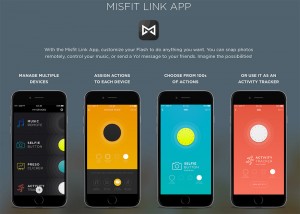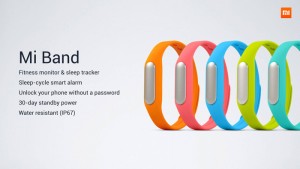![]() Misfit Wearables launched a fitness tracker, the Flash Link, for under $20. The device offers “more powerful at a lower price,” according to the title of the company’s press release yesterday.
Misfit Wearables launched a fitness tracker, the Flash Link, for under $20. The device offers “more powerful at a lower price,” according to the title of the company’s press release yesterday.
Available now on Misfit’s website, the Flash Link is described as “an easy-to-use activity tracker and smart button. A low priced, modular, and multi-functional wearable, Flash Link gives users even more ways to connect with the world around them. Use any Flash or Flash Link with the Misfit Link app to take a selfie, control your music (pause, play, skip songs, adjust the volume), or advance slides in a presentation.”
 Those additional “ways to connect with the world” and the “more powerful” aspects are enabled through the Flash app (now via iOS, and via Android in August). The music controls work with Apple Music, iTunes, Pandora, SoundCloud, and Spotify. Misfit plans additional functionality for managing smart home devices like the Nest (which Google acquired in January 2014 for $3.2 billion), IFTTT, and Logitech Harmony home hub.
Those additional “ways to connect with the world” and the “more powerful” aspects are enabled through the Flash app (now via iOS, and via Android in August). The music controls work with Apple Music, iTunes, Pandora, SoundCloud, and Spotify. Misfit plans additional functionality for managing smart home devices like the Nest (which Google acquired in January 2014 for $3.2 billion), IFTTT, and Logitech Harmony home hub.
As shown by the first graphic, the Flash Link isn’t a wristband, but a clip device that can be worn on anything it can be clipped to, such as a shirt, a shoe, or…yes, even a wrist.
 Health Populi’s Hot Points: The Flash Link’s price-point is now closer to what has been the lowest-price activity tracker on the market, the Mi Band from Xiaomi, which retails for about $18 on Amazon. That low-cost device was rated here on CNET as an “ultracheap fitness band” that “gets the job done.”
Health Populi’s Hot Points: The Flash Link’s price-point is now closer to what has been the lowest-price activity tracker on the market, the Mi Band from Xiaomi, which retails for about $18 on Amazon. That low-cost device was rated here on CNET as an “ultracheap fitness band” that “gets the job done.”
With the launch of Flash Link, Misfit meets its objective of designing consumer technology that is accessible to pretty much all people. As Tim Golnik, the VP of Product and Design at Misfit said, “We’re focused on making products everyone can use.”
Beyond the functionality of being a pedometer, the Flash Link toggles to the Internet of Things world through its smart home connections and ability to control phone photos, music, and what Misfit promises will be a growing list of connected IoT applications. That’s a lot of bang for a $20 bill, and a disruption to the (more pricey) oversupplied wristband activity tracker market.




 Thank you, Jared Johnson, for including me on the list of the
Thank you, Jared Johnson, for including me on the list of the  I am so grateful to Tom Lawry for asking me to pen the foreword for his book, Health Care Nation,
I am so grateful to Tom Lawry for asking me to pen the foreword for his book, Health Care Nation,  Thanks to Feedspot for naming this blog, Health Populi, as a
Thanks to Feedspot for naming this blog, Health Populi, as a